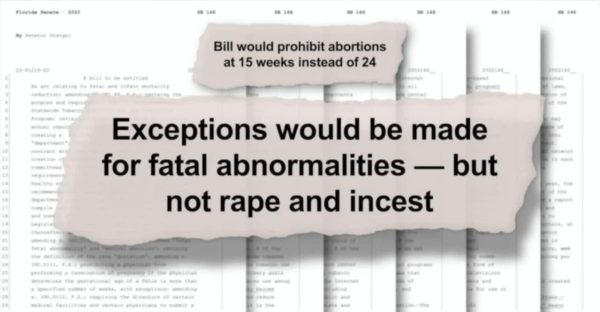

President Office — Press Release
FOR IMMEDIATE RELEASE
CONTACT: Katie Betta, (850) 487-5229
March 3, 2022
Prohibits abortion after 15 weeks, expands programs to reduce fetal and infant deaths
Tallahassee —
The Florida Senate today passed House Bill 5, Reducing Fetal and Infant Mortality, by Senator Kelli Stargel (R-Lakeland).
Taking into account modern medical and scientific knowledge that confirms significant developmental milestones of an unborn child, the legislation prohibits abortion after the unborn baby has reached 15 weeks of gestational age.
The legislation also increases health care and education resources available to pregnant mothers and women who may become pregnant with a focus on the prevention of fetal and infant death in Florida.
“We have a duty to protect life. This bill safeguards innocent, unborn children with beating hearts, who can move, taste, see, and feel pain,” said Senator Stargel.
“In the half century since the Roe v. Wade decision, science has shown us that an unborn baby rapidly develops the functions and form of a child long before viability.
I am grateful to my Senate colleagues for their support and look forward to seeing this pro-life legislation signed into law by Governor DeSantis.”
“Every abortion kills a special and unique human being who deserves protection under the laws of this state and the chance to grow up in a loving family,” said Senate President Wilton Simpson (R-Trilby).
“Growing up as an adopted child in a family that took in foster children, it has always been important to me that our state do everything we can to promote adoption as an alternative to abortion.
Floridians can be proud that we live in a state that not only protects innocent, unborn life, but also supports children and parents.
I commend Senator Stargel for her dedication to strong pro-life, pro-child, and pro-family legislation.”
The bill clarifies the term “gestation” to provide a more commonly understood and medically accepted measurement of development.
As such, the bill defines the term “gestation” to calculate from the first day of the last menstrual period (LMP) rather than from fertilization.
This guarantees a more consistent application than counting from fertilization by relying less on physician interpretation.
With regard to the prohibition on abortion following 15 weeks of gestation, the bill provides the same exceptions under current law for the prohibition on third trimester abortions to protect the health and safety of the mother.
The legislation adds an exception for a “fatal fetal abnormality,” a terminal condition that, in reasonable medical judgment, is incompatible with life outside the womb and will result in death upon birth or imminently thereafter.
Because fatal fetal abnormalities are often not identified until testing during the second trimester, abortion may be performed if two physicians certify in writing that a fatal fetal abnormality is present.
Improved Reporting on Human Trafficking
The bill also provides for improvements to the reporting of data on abortions, including increased reporting on human trafficking and requiring the use of standardized forms consistent with the U.S. Standard Report of Induced Termination of Pregnancy adopted by the CDC.
Fetal and Infant Mortality Review Committees
The bill expands and funds fetal and infant mortality review committees (FIMRs) in areas of the state that do not currently have a program to reduce fetal and infant mortality and morbidity.
These locally organized groups review fetal and infant deaths in their areas, report on causes and trends, make recommendations, and engage with other community stakeholders — including Healthy Start, hospitals, and physicians — in initiatives and efforts to reduce fetal and infant mortality and morbidity.
Florida Perinatal Quality Collaborative Initiatives
Requires all hospitals that offer labor and delivery services to participate in at least two initiatives within the Florida Perinatal Quality Collaborative (FPQC, which is housed at the University of South Florida) to reduce infant mortality.
Tobacco Education and Use Prevention
The bill also directs the Florida Department of Health (DOH) to target counter-marketing advertising campaigns under the Comprehensive Statewide Tobacco Education and Use Prevention Program specific to pregnant women and women who may become pregnant to inform them about the potential risks and harm of tobacco use.
more recommended stories
 Fentanyl Seizures at Border Continue to Spike, Making San Diego a National Epicenter for Fentanyl Trafficking
Fentanyl Seizures at Border Continue to Spike, Making San Diego a National Epicenter for Fentanyl TraffickingFentanyl Seizures at Border Continue to.
 Utah Man Sentenced for Hate Crime Attack of Three Men
Utah Man Sentenced for Hate Crime Attack of Three MenTuesday, August 8, 2023 A.
 Green Energy Company Biden Hosted At White House Files For Bankruptcy
Green Energy Company Biden Hosted At White House Files For BankruptcyAug 7 (Reuters) – Electric-vehicle parts.
 Former ABC News Reporter Who “Debunked” Pizzagate Pleads Guilty of Possessing Child pδrn
Former ABC News Reporter Who “Debunked” Pizzagate Pleads Guilty of Possessing Child pδrnFriday, July 21, 2023 A former.
 Six Harvard Medical School and an Arkansas mortuary Charged With Trafficking In Stolen Human Remains
Six Harvard Medical School and an Arkansas mortuary Charged With Trafficking In Stolen Human RemainsSCRANTON – The United States.
 Over 300 People Facing Federal Charges For Crimes Committed During Nationwide Demonstrations
Over 300 People Facing Federal Charges For Crimes Committed During Nationwide DemonstrationsThe Department of Justice announced that.
